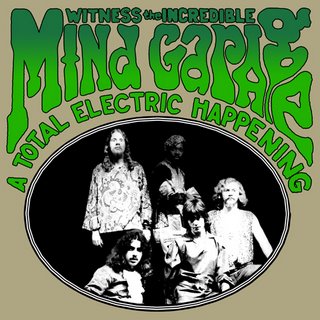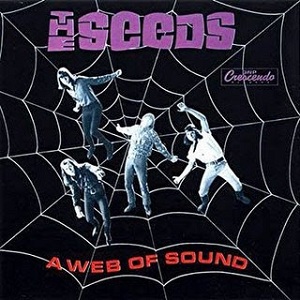Garage rock is a raw and energetic style of rock and roll that flourished in the mid-1960s, most notably in the United States and Canada, and has experienced a series of subsequent revivals. The style is characterized by basic chord structures played on electric guitars and other instruments, sometimes distorted through a fuzzbox, as well as often unsophisticated and occasionally aggressive lyrics and delivery. Its name derives from the perception that groups were often made up of young amateurs who rehearsed in the family garage, although many were professional.

The Seeds were an American psychedelic garage rock band formed in Los Angeles, California in 1965, best known for their highest-charting single "Pushin' Too Hard". The band's classic line-up featured frontman Sky Saxon, guitarist Jan Savage, keyboardist Daryl Hooper and drummer Rick Andridge. In 1968, the band changed their name to Sky Saxon and the Seeds, with Savage and Andridge departing the band. They went on to release a handful of additional singles, with Hooper also departing at some point before splitting up in circa 1972.

Fred Neil was an American folk singer-songwriter active in the 1960s and early 1970s. He did not achieve commercial success as a performer and is mainly known through other people's recordings of his material – particularly "Everybody's Talkin'", which became a hit for Harry Nilsson after it was used in the film Midnight Cowboy in 1969. Though highly regarded by contemporary folk singers, he was reluctant to tour and spent much of the last 30 years of his life assisting with the preservation of dolphins.
The Shag were an American garage and psychedelic rock band in the 1960s, best known for their 1967 single "Stop and Listen". They were one of numerous bands at the time using the name "The Shags".

Mind Garage-Early Years was recorded by the Mind Garage, the first hard rock band recognized nationally as a Christian Rock band when America tuned into a Christian rock worship service in 1969 on ABC TV. The song, "Water" was used in the service. The term "Christian rock" had not yet been coined in 1968 and these compositions can be considered the missing link between secular and Christian rock music.

A Web of Sound is the second album by the American garage rock band the Seeds. Produced by Marcus Tybalt and released in October 1966, it contained the single "Mr. Farmer" and the 14-minute closing song "Up In Her Room". The album did not chart, though it has received generally favorable reviews from music critics.

Evil was a garage rock band from Miami, Florida, active between late 1965 and early 1967. They were known for a hard–driving, sometimes, thrashing 60s punk sound that combined elements of blues, rockabilly, and British invasion influences. They recorded several songs, amongst which “Always Runnin' Around” and “Whatcha Gonna Do” were released as a single on Living Legend Records in 1966. The band would eventually be signed to Capitol Records, but broke up shortly thereafter. In more recent years they have become particularly noted for several previously unreleased songs recorded in 1966, which have been released in recent years on various independent labels from acetates, such as "From a Curbstone," "Short Life," and especially "I'm Movin' On," which is now regarded as a garage classic.

The Gentlemen were an American garage rock band from Dallas, Texas, who were active from 1964 to 1968. They are best known for their 1966 song, "It's a Cry'n Shame", which has been recognized as one of the greatest songs in garage rock. The band is noted for the contributions of guitarist and songwriter, Seab Meador. Jimmie Vaughan, later a member the Fabulous Thunderbirds and brother of Double Trouble guitarist Stevie Ray Vaughan, served a brief stint for several months in the Gentlemen in late 1965 and early 1966, but did not appear on any of their recordings. He went on to play in another Dallas garage rock band, the Chessmen.
"It's a Cry'n Shame" is a song written by Seab Meador and Mike Kelley and was recorded in 1966 by the Gentlemen, an American garage rock band from Dallas, Texas who were active between 1964 and 1968. It was originally released as the B-side to "You Can't Be True" but has become by far the better-known song. "It's a Cry'n Shame" has been included in several garage rock compilations and is now recognized as one of the greatest songs in the genre.

The Painted Faces were an American garage rock/psychedelic rock band from Fort Myers, Florida who were active from 1967 through 1969, who were not only popular in Florida but achieved a following outside of their own region by playing regular shows in New York City and elsewhere. After disbanding they became practically unknown for a number of years, but since the 1980s, with the reissue their songs on various compilations, they have come to the attention of garage rock and psychedelic devotees. They are known for songs such as "Anxious Color", which Mojo magazine named one of the top 100 psychedelic songs of all time.

Back from the Grave, Volume 3 (LP) is the third installment in the Back from the Grave series of garage rock compilations put together by Tim Warren of Crypt Records. It was released in 1984. In keeping with all of the entries in the series, and as indicated in the subheading which reads "Mid 60s Garage Punkers," this collection consists of songs which display the rawer and more aggressive side of the genre and are often characterized by the use of fuzztone-distorted guitars and rough vocals. The set generally excludes psychedelic, folk rock, and pop-influenced material in favor of basic primitive rock and roll. The packaging features well-researched liner notes written by Tim Warren which convey basic information about each song and group, such as origin, recording date, and biographical sketches, usually written in a conversational style that includes occasional slang, anecdotes, humorous asides. The liner notes are noticeably opinionated, sometimes engaging in tongue-in-cheek insults directed at other genres of music. The packaging also includes photographs of the bands, and the front cover features a highly satirical cartoon by Mort Todd depicting revivified "rock and roll" zombies who have just emerged from the grave to "drop in a pit" all adherents of supposedly "heretical" pop and progressive music which have come to prominence over the years.

Back from the Grave, Volume 9, released on LP in 2015, is the ninth installment in the Back from the Grave series of garage rock compilations. Like all the entries in the series it was assembled by Tim Warren of Crypt Records. As indicated in the subheading which reads "Raw Blastin' Mid 60s Punk," this collection consists of many songs which display the rawer and more aggressive side of the genre and are often characterized by the use of fuzztone-distorted guitars and rough vocals. In typical fashion, the set generally excludes psychedelic, folk rock, and pop-influenced material in favor of basic primitive rock and roll.

The Montells were an American garage rock band from Miami, Florida who were active in the 1960s. They briefly operated under the name H.M. Subjects and recorded a version of the Pretty Things's "Don't Bring Me Down," which while in the process of becoming a local hit, became embroiled in a controversy involving Morton Downey, Jr., then a disc jockey at Miami's WFUN and later of talk show fame. The song was criticized for its apparently sexually suggestive lyric and the contention that Downey allegedly took payola for the song, an allegation which was never proven. The band went on to record another single, once again as the Montells, featuring an A-side for which they are remembered, "You Can't Make Me." They broke up in 1967, but reunited for a performance in 2008.

Sir Winston and the Commons were an American garage rock band formed in Indianapolis, Indiana, in 1963. The group released two highly regarded singles, which, upon release, earned the band a regional following, and resulted in reinterest in their music over the years. At the height of their popularity, Sir Winston and the Commons were regulars at the teen dance club the Cellar, in Chicago.
The Rovin' Flames were an American garage rock band formed in Tampa, Florida in 1965. Releasing five singles in their recording career, which was sometimes plagued by multiple line-up changes, the group is best-remembered for their final record "How Many More Times". The song was the Rovin' Flames biggest hit and remains their most accessible tune due to its appearances on several compilation albums.
The Echoes of Carnaby Street were an American garage rock band from Miami, Florida who were active in the 1960s. They became a popular live act in the Miami area and enjoyed a minor regional hit with "No Place Or Time", released on Thames Records. In the intervening years their work has come to the attention of garage rock enthusiasts, particularly with the inclusion of "No Place No Time" on the 1986 Louisiana Punk Groups From The 60's Vol. 1 compilation, which paradoxically resulted in helping contribute to the misconception that they were a Louisiana band.
Johnny Salton was a rock guitarist for bands from Florida from the late 1970s until his death in 2010. He is best known for his work with Charlie Pickett. According to Salton's friend and fellow guitarist, Peter Buck of R.E.M., "when he played really well, he just floated above everyone else."
Robert Dukoff, known as Bobby Dukoff, was an American Big Band tenor saxophonist, clarinetist, composer, audio engineer and saxophone mouthpiece maker. He is known for his Dukoff Mouthpieces, which he began producing commercially in Los Angeles in 1945, and later in Miami from the mid-1970s.











